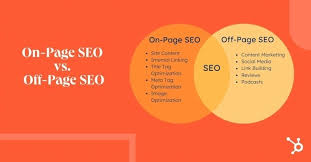
Search Engine Optimization (SEO) is a crucial aspect of digital marketing that helps websites rank higher in search engine results pages. While off-page SEO factors like backlinks are important, on-page optimization plays a significant role in improving a website’s visibility and relevance to search engines.
On-page SEO optimization involves optimizing various elements on a webpage to make it more search engine-friendly. This includes optimizing meta tags, headings, content, images, and internal links. By focusing on these elements, website owners can improve their chances of ranking higher for relevant keywords.
In conclusion, on-page SEO optimization is a critical component of any successful SEO strategy. By paying attention to key elements such as title tags, meta descriptions, headings, content, images, and internal links, website owners can improve their website’s visibility and attract more organic traffic from search engines.
SEO on-page optimization refers to the practice of optimizing various elements within a webpage to improve its visibility and relevance in search engine results. This process involves strategically incorporating relevant keywords into meta tags, headings, content, images, and internal links. By focusing on on-page SEO techniques, website owners aim to make their content more search engine-friendly and increase their chances of ranking higher for specific keywords. Ultimately, on-page optimization plays a crucial role in enhancing a website’s overall SEO performance and attracting organic traffic from search engines.
SEO, or Search Engine Optimization, works by optimizing various elements on a website to improve its visibility and ranking in search engine results pages. On-page SEO optimization focuses on elements such as meta tags, headings, content, images, and internal links to make a webpage more search engine-friendly. By incorporating relevant keywords, creating high-quality content, and improving the overall structure of a website, SEO aims to enhance the website’s relevance and authority in the eyes of search engines like Google. Ultimately, SEO helps websites attract organic traffic by making them more accessible and valuable to users searching for relevant information or products online.
An example of SEO (Search Engine Optimization) can be seen in the practice of optimizing a website’s on-page elements, such as meta tags, headings, content, images, and internal links, to improve its visibility and ranking on search engine results pages. By strategically incorporating relevant keywords and ensuring that the website’s content is high-quality and user-friendly, businesses can attract more organic traffic and enhance their online presence. This example illustrates how effective on-page SEO optimization can help websites connect with their target audience and achieve higher search engine rankings.
Off-page optimization in SEO refers to the strategies and techniques used outside of a website to improve its search engine rankings and visibility. While on-page optimization focuses on optimizing elements within a webpage, off-page optimization involves activities such as link building, social media marketing, and influencer outreach to enhance a website’s authority, relevance, and trustworthiness in the eyes of search engines. Off-page SEO plays a crucial role in determining a website’s overall credibility and can significantly impact its ability to rank well in search engine results pages.